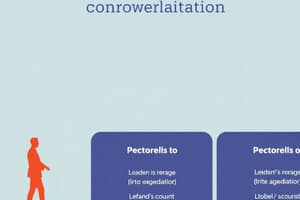Podcast
Questions and Answers
What is the primary focus of the Job Characteristics Model (JCM)?
What is the primary focus of the Job Characteristics Model (JCM)?
- Increasing job satisfaction through higher pay
- Enhancing job dimensions to improve motivation and performance (correct)
- Implementing strict supervision for better control
- Reducing the number of tasks to simplify work
How does Job Enlargement differ from Job Enrichment?
How does Job Enlargement differ from Job Enrichment?
- Job Enlargement involves increasing tasks, while Job Enrichment gives workers more control over their work (correct)
- Job Enlargement is about client relationships, while Job Enrichment is about feedback channels
- Job Enlargement involves shifting employees between tasks, while Job Enrichment involves task significance
- Job Enlargement increases task variety, while Job Enrichment increases worker autonomy
Which of the following is NOT a consequence of employee dissatisfaction according to the text?
Which of the following is NOT a consequence of employee dissatisfaction according to the text?
- Voice
- Loyalty (correct)
- Neglect
- Exit
What are some outcomes associated with high job satisfaction according to the text?
What are some outcomes associated with high job satisfaction according to the text?
Which of the following is a key component of employee engagement mentioned in the text?
Which of the following is a key component of employee engagement mentioned in the text?
What does Job Rotation involve according to the text?
What does Job Rotation involve according to the text?
What is the primary focus of the Job Characteristics Model?
What is the primary focus of the Job Characteristics Model?
Which factor is NOT a key determinant of job satisfaction according to the text?
Which factor is NOT a key determinant of job satisfaction according to the text?
What is a common outcome of high employee engagement?
What is a common outcome of high employee engagement?
Which concept refers to an individual's emotional attachment to, identification with, and involvement in the organization?
Which concept refers to an individual's emotional attachment to, identification with, and involvement in the organization?
What does the Job Characteristics Model suggest can lead to increased motivation and satisfaction at work?
What does the Job Characteristics Model suggest can lead to increased motivation and satisfaction at work?
How does job enrichment differ from job enlargement?
How does job enrichment differ from job enlargement?
Which of the following is a common outcome of perceiving an imbalance of rewards for effort, as per the equity theory?
Which of the following is a common outcome of perceiving an imbalance of rewards for effort, as per the equity theory?
What does job involvement entail?
What does job involvement entail?
What characterizes affective organizational commitment?
What characterizes affective organizational commitment?
According to the causes of job satisfaction, what role does work provide for individuals?
According to the causes of job satisfaction, what role does work provide for individuals?
How is employee engagement defined?
How is employee engagement defined?
What does normative organizational commitment entail?
What does normative organizational commitment entail?
Study Notes
Job Characteristics Model
- Combines tasks to enhance job dimensions
- Increases skill variety and task identity
- Establishes natural work units and task significance
- Encourages client relationships and autonomy
- Provides open feedback channels
Job Design
- Job rotation: periodic shifting of employees between tasks
- Job enlargement: increasing the number and variety of tasks
- Job enrichment: increasing worker control over planning, execution, and evaluation of work
Motivation, Performance, and Job Satisfaction
- Job satisfaction is not a strong predictor of work performance
- Dissatisfaction can drive individuals to behave in certain ways (voice, loyalty, neglect, exit)
Alternate Work Arrangements
- Flextime
- Job sharing
- Telecommuting
- Employee ability, competence, and opportunities to show performance
- Willingness to make extra effort
Job Satisfaction Outcomes
- Better job and organizational performance
- Better organizational citizenship behaviors
- Greater customer satisfaction
- Lower absenteeism and turnover
- Lower levels of workplace deviance
Equity Theory
- People compare their work and rewards to others
- Inequitable perceptions lead to unhappiness, reduced work efforts, or exiting the organization
- Equitable perceptions maintain consistent work effort
- Generous perceptions lead to feelings of guilt and increased work efforts
Job Attitudes
- Positive job attitudes predict constructive behaviors
- Negative job attitudes predict undesirable behaviors
- Types of job attitudes: job involvement, organizational commitment, perceived organizational support, employee engagement, and job satisfaction
Job Involvement
- Identifying with a job and considering performance as important to self-worth
Perceived Organisational Support
- Belief that the organization values their contribution and cares about their well-being
- Rewards viewed as fair
- Employees participate in decision-making
- Supervisors are supportive of employees
Employee Engagement
- Involvement with, satisfaction with, and enthusiasm for work
Organisational Commitment
- Identifying with a particular organization and its goals
- Affective commitment: emotional attachment to the organization
- Continuance commitment: perceived economic value of remaining with the organization
- Normative commitment: obligation to remain with the organization for moral or ethical reasons
Studying That Suits You
Use AI to generate personalized quizzes and flashcards to suit your learning preferences.
Description
Test your knowledge on the Job Characteristics Model (JCM) and Job Rotation. Explore how job enrichment impacts factors like advancement, supervision, and co-worker relationships. Refer to articles by Bauer & Erdogan (2012), Robbins & Judge (2014), and Moerdyk et al. (2015) for in-depth study material.




